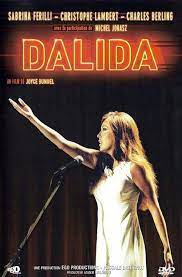
DALIDA
France, 2016, 127 minutes, Colour.
Sveva Alviti, Ricardo Scarmacio, Jean-Paul Rouve, Neils Schneider, Alessandro Borghi, Nicolas Duvauchelle, Valentina Carli, Vincent Perez, Bruno Placido.
Directed by Lisa Azuelos.
For audiences familiar with popular singers from the 1950s to the 1980s, the name of Dalida will be well known. She had great success in France, in Italy and, ultimately, internationally and in the United States. But, for those who are not familiar with singers of the period, for later generations, this is a portrait/biography of Dalida.
In many ways, the portrait is of jigsaw pieces, an opening in 1967 and the singers attempted suicide, going back two months earlier to dramatise the situation, then interviews with her close associates and relatives as she goes into rehabilitation. And, in this context, various flashbacks to explain her character, her coming from an Italian family living in Cairo, her father a violinist and teacher, interned during the war because of suspicions of Italians, the little girl, Iolita Gigliotti, bullied at school for wearing glasses, self-conscious…
Then to the 1950s, her performance in the competition, impressing producers and radio station owners, becoming a success in her mid-20s. The film contains a range of songs from those decades, as background to the portrait, often with lyrics which reflect her state of mind and what is going on in her life.
Since we know from the beginning that she attempted suicide, and we see her relationship with a protégé, talking of Heidegger and human propensity for death, we become aware that there are significant men in her life, very complicated relationships. There is the radio station owner who discovered her, promoted her, marries her but who partly alienates her because of his wanting to promote her career rather than begin a family. Then there is her brother, played by Italian actor Ricardo Scarmacio, always there, promoter, protector, critic. She becomes infatuated with a Polish-born artist, promoting a composer singer, performing at the San Remo Festival, hostile to audience reaction, walking offstage, killing himself – which was the occasion for her attempted suicide.
Later, there is a very young man, a student who becomes infatuated with her – which leads to a crisis in her life, a crucial decision that goes against her great desire, and the termination of a pregnancy.
Finally, there is a rather long relationship with a pretentious show man, lasting for years but not without its brittle moments, his taunting her, then making a record together despite his lack of talent, a violent episode and her bailing him from jail.
The latter part of the film focuses on her successful career, especially after she visits an Indian ashram in the Guru highlights how singing is her whole life and location.
The impact of the film will depend on how it arouses interest in the life of Dalida and her career, some audiences becoming involveda.d, other audiences, probably, observing and somewhat detached.
- Audience knowledge of Dalida? Her career? Her life? Singer and sickness?
- A biography of the singer, a portrait? The structure of the screenplay, 1967, going back two months, the aftermath of the suicide attempt, memories of Egypt and her family and being bullied, her success in the 1950s and 1960s, relationships, intensity, her family, flashbacks? The screenplay moving more quickly towards the end, time in India at the ashram, her vocation to sing, success in France, Italy, International? Yet her depression, suicide attempts? Her final note?
- The music, songs of the period, Dalida successful songs? Performances? The lyrics chosen to represent her states of mind? Her life?
- The picture of the young girl, Italian in Egypt, her father the violinist, the support of her mother, wearing glasses, bullied at school, the sympathetic nuns, her father arrested and interned? Support of her mother, the visit to her father camp, his release after the war, his brutal behaviour towards his family? Her wishing him dead?
- The competition, the producers, the radio stations in the 1950s, the bets, going to the concert, impressed by Dalida? Lucien, the approach, the contracts, radio, performances, recordings? The personal relationship? Her love? His interest in her career, his divorce, the quick marriage, the lingering love but the surface distance? The other produces, subsequent discussions, contracts, with her brother and the company?
- Her family, the support of her brother, manager, the recordings, success, over the years? His attitude towards her lovers? The hostility towards Lucio at Christmas? Suspicions of Richard? His consistency over the years? The other members of the family, the birth of the baby, her delight, godmother? In the light of her own pregnancy, her love for Lucio, concealing the pregnancy, the abortion, the reasons? The aftermath, her not being able to bear children?
- The personal relationships, with Lucien, the marriage, brittle, the meetings, his threats to her, his marrying again, his going to the concert, admiration for her, listening to her on the television, shooting himself? The Polish artist, his making advances, the liaison, their time together, her success, his drinking, the separation? The encounter with Luigi, his art, taking him on as manager with her brother, the San Remo Festival, the personal liaison, the discussions about Heidegger and death, love? His walking off the stage, his protest against the audience, killing himself? Her reaction, her attempted suicide?
- The aftermath of the suicide attempt, the psychologist and the discussions, the interviews with Lucien, with her brother, with the artist? Her recovery? Institution?
- Luciana, coming to visit, the poetry, his age, the liaison, hitchhiking, Christmas, the pregnancy, his not being told, her note, the check for his education?
- The 1970s, the ashram, the wisdom of the Guru, her return, the next 10 years, success, interviews, with the American dances, American success, going to Egypt, her participation in the film, a claim in Egypt?
- Her depression, the Catholic background, going to the church before the abortion, writing the note, her death?